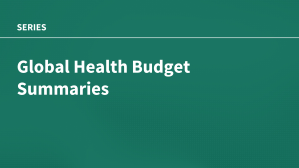House Appropriations Committee Approves the FY 2025 State and Foreign Operations (SFOPs) Appropriations Bill
The House Committee on Appropriations approved the FY 2025 State, Foreign Operations, and Related Programs (SFOPs) appropriations bill and accompanying report on June 12, 2024. The SFOPs bill includes funding for U.S. global health programs at the State Department and the U.S. Agency for International Development (USAID). Funding for these programs, through the Global Health Programs (GHP) account, which represents the bulk of global health assistance, totaled $9.3 billion, a decrease of $1.3 billion (-12%) below the FY 2024 enacted level and $559 million (-6%) below President Biden’s FY 2025 request. As compared to FY 2024 enacted levels, funding for the Global Fund to Fight AIDS, Tuberculosis and Malaria (Global Fund) and family planning and reproductive health (FP/RH) declined (the Global Fund decrease is related to a funding match requirement that limits the amount the U.S. can contribute — a cap of 33% of total contributions to the Global Fund for all other donors), while all other areas either remained flat or increased slightly; funding for global health security was not specified.[i] The bill does not include funding for the United Nations Population Fund (UNFPA), World Health Organization (WHO), or Pan American Health Organization (PAHO). The bill also eliminates funding for the International Organizations & Programs (IO&P) account, which has historically been the source of U.S. contributions to the United Nations Children’s Fund (UNICEF).[ii]
Policy provisions in the bill include:
- the Helms amendment, a standard provision that is regularly included in appropriations bills (see the KFF fact sheet here),
- an expanded Mexico City Policy (Protecting Life in Global Health Assistance) that was put in place by President Trump and rescinded by President Biden (see the KFF explainer here),
- a provision stating that support for multilateral organizations through the Contributions to International Organizations (CIO) account must comply with statutory prohibitions and requirements related to abortion,
- a provision stating that if the President/Executive Branch agrees to the pandemic treaty at the World Health Assembly without first submitting it to the Senate and receiving Senate approval, no funding for global health security may be obligated (see the KFF brief on the Pandemic Treaty here),
- a provision for the Secretary of State to submit a report to the Committee on Appropriations within 90 days of the Act detailing the origins of COVID-19,
- and a restriction on provision of funding to any domestic or international NGO that provides gender-affirming care.
See other budget summaries and the KFF budget tracker for details on historical annual appropriations for global health programs.
[i] The explanatory statement accompanying the House FY25 SFOPs appropriations bill does not provide specific funding amounts for FP/RH or global health security (GHS) under the GHP account. After the funding amounts specified for all other areas (e.g., HIV, TB, MCH, etc.) are removed, $864.71 million remains under the GHP account at USAID, which is funding that could be used for FP/RH and GHS (or other areas as determined by the Administration). Since the House FY25 bill text states that “of the funds appropriated by this Act, not more than $461,000,000 may be made available for family planning/reproductive health” without specifying an account, it is possible the Administration could fund all or a portion of this amount through the GHP account with the remainder directed to GHS (or other areas as determined by the Administration). If the Administration funds the full $461 million through the GHP account, this could represent a significant decrease to GHS funding; if the Administration funds the full $461 million through non-GHP accounts, this could represent an increase to GHS funding.[ii] It is possible that funding for UNICEF may be provided through another account.

